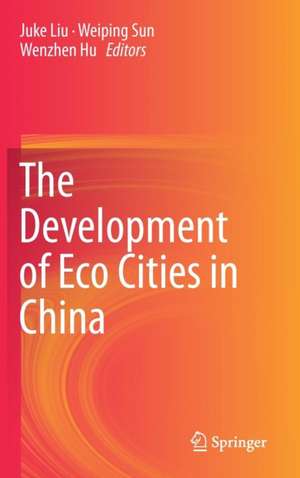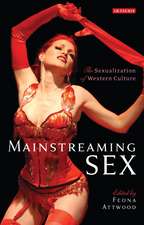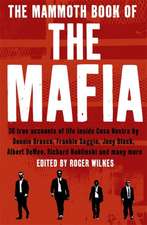The Development of Eco Cities in China
Editat de Juke Liu, Weiping Sun, Wenzhen Huen Limba Engleză Hardback – 25 oct 2016
This book presents an in-depth study on and summary of the current practice and theories for the construction of eco-cities in China in the context of the country’s rapid urbanization. It argues that by 2020, 60% of China’s population will live in cities. And the evolution from “green cities” to “eco- cities”, and subsequently to “smart cities” is crucial to China’s sustainable development.
The book presents a feasible and objective quantitative evaluation system for the sustainable and healthy development of eco-cities. It summarizes the Chinese experience in building eco- cities as the coordinated development of economy, society, resources and environment, with the goal being “to make cities inclusive, safe, resilient and sustainable”. This is essential to achieving a number of the United Nations’ Sustainable Development Goals. In addition, the book defines the current stage of development Chinese cities have reached in terms of ecological construction, andoffers guidance on selecting suitable urban ecological construction modes and improvement approaches. It provides a valuable reference source and guidebook for research on and the practice of eco-city construction. Accordingly, it will help other countries around the world, especially the developing countries, to benefit from China’s successful experience.
| Toate formatele și edițiile | Preț | Express |
|---|---|---|
| Paperback (1) | 564.76 lei 38-44 zile | |
| Springer Nature Singapore – 29 iun 2018 | 564.76 lei 38-44 zile | |
| Hardback (1) | 651.02 lei 6-8 săpt. | |
| Springer Nature Singapore – 25 oct 2016 | 651.02 lei 6-8 săpt. |
Preț: 651.02 lei
Preț vechi: 765.90 lei
-15% Nou
Puncte Express: 977
Preț estimativ în valută:
124.57€ • 130.06$ • 103.10£
124.57€ • 130.06$ • 103.10£
Carte tipărită la comandă
Livrare economică 05-19 aprilie
Preluare comenzi: 021 569.72.76
Specificații
ISBN-13: 9789811022869
ISBN-10: 9811022860
Pagini: 335
Ilustrații: XV, 329 p. 36 illus.
Dimensiuni: 155 x 235 x 21 mm
Greutate: 0.71 kg
Ediția:1st ed. 2017
Editura: Springer Nature Singapore
Colecția Springer
Locul publicării:Singapore, Singapore
ISBN-10: 9811022860
Pagini: 335
Ilustrații: XV, 329 p. 36 illus.
Dimensiuni: 155 x 235 x 21 mm
Greutate: 0.71 kg
Ediția:1st ed. 2017
Editura: Springer Nature Singapore
Colecția Springer
Locul publicării:Singapore, Singapore
Cuprins
Preface.- Part I: The Exploration of the Theory and Practice of the Eco City Construction in China.- The Principle of “Following the Way the Human Body Works” in the Construction of an Eco City.- Construction of Eco Cities in China in an Information Age.- The Economic Development and the Environmental Protection of the Eco City .- The Space Layout and Planning of the Eco City Construction in China.- The Evaluation Report of the Health Conditions of the Eco Cities in China.- Part II: The Development Pattern of the Eco City Construction with Chinese Characteristics.- The Evaluation Report on the Construction of Environment-friendly Cities.- The Development Mode of the Resource-Saving City.- The Evaluation Report on the Construction of the Circular Economy Oriented City.- The Development Mode of the Landscape and Leisure Oriented City.- The Distribution Pattern and Practical Exploration of the Green Consumption City in China.- The Development Mode of the Comprehensive Innovative City.- Part III: Typical Cases of the Eco City Construction.- Cases of the Eco City.- Cases of New Energy Development.- Cases of Ecological Engineering.- Appendix.
Notă biografică
Liu Juke: male, professor, editor-in-chief of Green Book of Eco-cities, vice-president of Gansu Institute for Urban Development, vice-president Lanzhou City University, president of Gansu Society for Urban Studies and member of National Guiding Committee for Self-study Higher Education Examination, an expert receiving special allowance form the State Council.
Sun Weiping: male, Ph. D., research fellow, doctoral supervisor, editor-in-chief of Green Book of Eco-cities, director of CASS Research Center for Social Development, deputy director of CASS Institute of philosophy, vice-president of the Society of Chinese Dialectical Materialism and of the Society of Chinese Modern Culture.
Hu Wenzhen: male, Ph. D., research fellow, editor-in-chief of Green Book of Eco-cities, vice director of CASS Research Center for Social Development and of the Research Center for Cultural Policy of CASS.
Textul de pe ultima copertă
This book presents an in-depth study on and summary of the current practice and theories for the construction of eco-cities in China in the context of the country’s rapid urbanization. It argues that by 2020, 60% of China’s population will live in cities. And the evolution from “green cities” to “eco- cities”, and subsequently to “smart cities” is crucial to China’s sustainable development.
The book presents a feasible and objective quantitative evaluation system for the sustainable and healthy development of eco-cities. It summarizes the Chinese experience in building eco- cities as the coordinated development of economy, society, resources and environment, with the goal being “to make cities inclusive, safe, resilient and sustainable”. This is essential to achieving a number of the United Nations’ Sustainable Development Goals. In addition, the book defines the current stage of development Chinese cities have reached in terms of ecological construction, andoffers guidance on selecting suitable urban ecological construction modes and improvement approaches. It provides a valuable reference source and guidebook for research on and the practice of eco-city construction. Accordingly, it will help other countries around the world, especially the developing countries, to benefit from China’s successful experience.
Caracteristici
Brings together the latest contributions from a group of top scholars working on the issue of eco-city development in China Argues that constructing eco-cities is the only sustainable path for China’s urbanization Presents the Chinese wisdom and practice of “making cities inclusive, safe, resilient and sustainable”
















